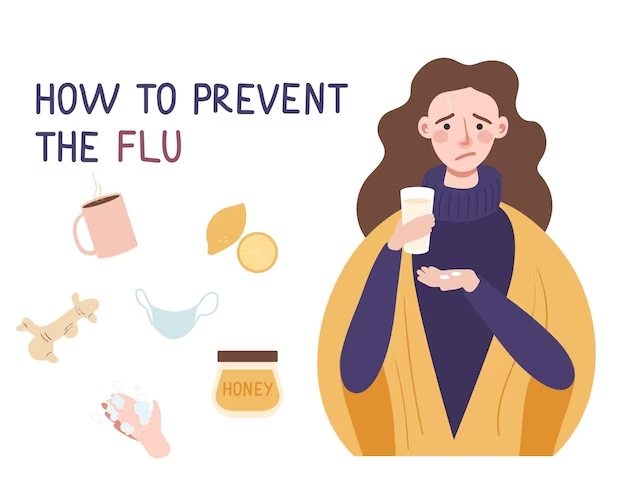10 Effective Strategies to Prevent Winter Colds and Flu

Winter is a season that brings not only chilly temperatures but also an increased risk of colds and flu infections. The good news is that there are proactive steps you can take to reduce your chances of falling victim to these pesky viruses. By incorporating these strategies into your daily routine, you can strengthen your immune system and protect yourself from winter colds and flu. In this comprehensive guide, we will explore ten effective strategies for preventing winter colds and flu, providing you with the tools you need to stay healthy throughout the season.
1. Nourish Your Body with Nutrient-Rich Foods
Maintaining a balanced and nutritious diet is crucial for supporting your immune system and overall health. Consuming a variety of fruits and vegetables provides essential vitamins, minerals, and antioxidants that boost your immune system. Aim for a colorful plate filled with nutrient-rich foods such as citrus fruits, leafy greens, and berries. Additionally, incorporating lean sources of protein, healthy fats, and staying hydrated can further support your immune system.
2. Consider the Power of Supplements
In some cases, it may be challenging to obtain all the necessary nutrients solely from your diet, especially during the winter months when seasonal food variety is limited. This is where supplements can play a crucial role in supporting your immune system. Consider adding vitamin D, zinc, omega-3 fatty acids, and probiotics to your daily routine to enhance your body’s ability to fight off infections and strengthen your immune response.
3. Say No to Processed Foods and Sugars
When it comes to preventing winter colds and flu, it’s essential to steer clear of foods that contribute to inflammation and weaken your immune system. Processed foods and excessive sugar intake can overwhelm your body and leave you more susceptible to illnesses. Opt for a vegetable-rich diet and choose whole, unprocessed foods that support your immune system’s optimal functioning.
4. Kick Unhealthy Habits to the Curb
In addition to avoiding unhealthy foods, it’s crucial to abstain from habits that can worsen inflammation and weaken your immune system. Alcohol and smoking are two common lifestyle habits that can significantly impact your body’s ability to fight off infections. Make a conscious effort to either avoid these habits altogether or limit them to minimize the strain on your immune system.
5. Prioritize Hydration for Optimal Health
Proper hydration is essential for every bodily function, including your immune system. Dehydration can impair your immune response and hinder your body’s ability to fight off infections. Keep a water bottle with you at all times, make it a habit to drink a glass of water first thing in the morning, and pay attention to your daily hydration habits. Listen to your body and drink enough water to stay properly hydrated.
6. Embrace the Healing Power of Nature
Spending time in nature has numerous benefits for your overall well-being, including strengthening your immune system. Fresh air and outdoor activities help improve blood circulation, enhance nutrient absorption, and lower stress levels. Make it a priority to spend time outdoors, whether it’s going for walks, hiking, or simply enjoying the beauty of the season. Embrace the healing power of nature and give your immune system a natural boost.
7. Enhance Your Sleep Quality
Quality sleep is vital for maintaining a strong immune system. During sleep, your body repairs and recharges, including vital immune cell regeneration. Lack of sleep can increase stress levels and inflammation, compromising your immune response. Focus on creating a sleep-friendly environment by reducing stress before bed, eliminating electronic devices from your bedroom, and establishing a consistent bedtime routine. Prioritize sleep for a resilient immune system.
8. Get Moving for a Stronger Immune System
Regular physical activity has a profound impact on your health, longevity, and immune system. Exercise improves blood circulation, enhances nutrient delivery, and helps flush out toxins from your body. It also reduces stress and inflammation, promoting a balanced immune response. Incorporate regular exercise into your routine, whether it’s through walking, jogging, yoga, or other activities you enjoy. Keep your body active to support your immune system’s readiness.
9. Manage Stress Levels for Optimal Immune Function
Chronic stress weakens your immune system and makes it harder for your body to fight off infections. Taking steps to manage stress is crucial, especially during the winter season when viruses and bacteria are prevalent. Find effective stress-reducing techniques that work for you, such as meditation, listening to music, journaling, or engaging in relaxing activities. Make stress management a regular part of your daily routine to support a robust immune system.
10. Adopt Other Smart Habits for Added Protection
In addition to the strategies outlined above, there are other smart habits you can incorporate into your lifestyle to further protect yourself from winter colds and flu. Consider incorporating regular or infrared sauna sessions to promote detoxification and strengthen your immune system. Explore lymphatic drainage massages for improved lymphatic flow and toxin elimination. Additionally, wearing a mask in crowded environments can provide an extra layer of defense against airborne pathogens.
By implementing these ten strategies, you can significantly reduce your risk of winter colds and flu. Nourish your body with nutrient-rich foods, consider supplements when necessary, avoid processed foods and unhealthy habits, prioritize hydration, spend time in nature, enhance your sleep quality, engage in regular physical activity, manage stress levels, and adopt other smart habits for added protection. With these proactive measures, you can strengthen your immune system and enjoy a healthier winter season. Stay well!




